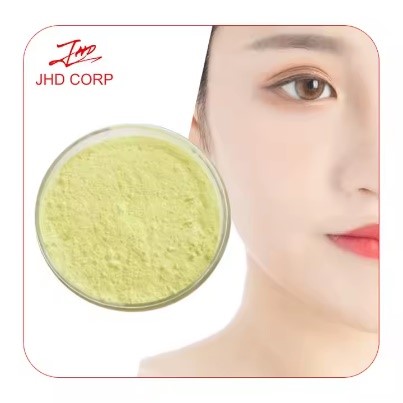Welcome to JHD Nutrasource!
Shop
NMNH
NMNH, or Reduced Nicotinamide Mononucleotide, is a novel compound that serves as a precursor to NAD+ (Nicotinamide Adenine Dinucleotide), a crucial molecule involved in cellular energy metabolism and aging processes. It is the reduced form of NMN (Nicotinamide Mononucleotide) and has shown potential for more effective NAD+ enhancement compared to NMN. However, NMNH is less stable and more prone to oxidation, making its storage and application more challenging.
Description
Function
- Enhanced NAD+ Production:
- NMNH is more effective than NMN in increasing NAD+ levels in cells and tissues, with studies showing a 5- to 10-fold increase in NAD+ levels compared to NMN. This enhanced NAD+ production supports cellular energy metabolism and DNA repair processes.
- Antioxidant and Anti-Aging Effects:
- By boosting NAD+ levels, NMNH helps reduce oxidative stress and cellular aging. It can slow down the aging process and improve overall cellular health.
- Metabolic Regulation:
- NMNH inhibits glycolysis and the TCA cycle (Tricarboxylic Acid Cycle), which helps regulate cellular metabolism and prevent metabolic imbalances.
- Cellular Repair and Immune Support:
- NMNH enhances mitochondrial function and supports cellular repair mechanisms, contributing to improved immune function and reduced inflammation.
- Inhibition of Abnormal Cell Growth:
- By inhibiting glycolysis and the TCA cycle, NMNH can suppress the growth of abnormal cells, making it a potential candidate for cancer prevention and treatment.
Application
- Anti-Aging Supplements:
- NMNH is being explored as a more potent alternative to NMN in anti-aging supplements, with the potential to provide longer-lasting and more effective benefits.
- Medical and Therapeutic Use:
- Due to its ability to enhance NAD+ levels and support cellular health, NMNH may be used in the treatment of age-related diseases, metabolic disorders, and neurodegenerative conditions.
- Nutraceuticals and Functional Foods:
- NMNH can be incorporated into nutraceuticals and functional foods to support overall health and wellness, particularly in aging populations.
- Cosmetics and Skincare:
- NMNH may be used in topical applications to promote skin health and reduce signs of aging by enhancing cellular repair and reducing oxidative stress.
- Research and Development:
- NMNH is an active area of research, with ongoing studies exploring its potential benefits and mechanisms of action in various biological systems.

